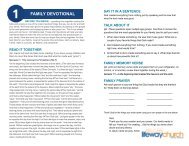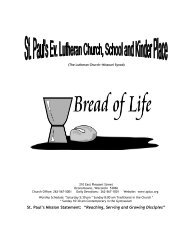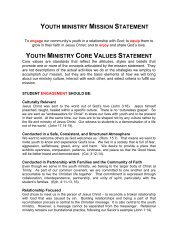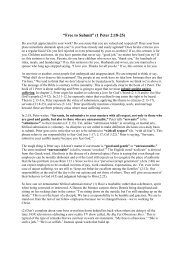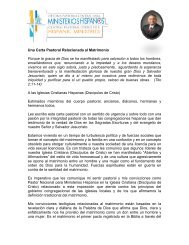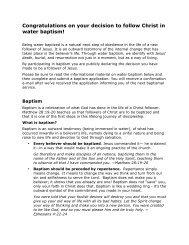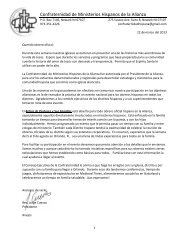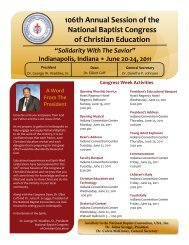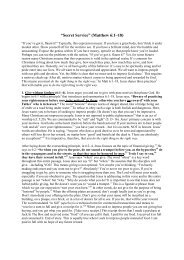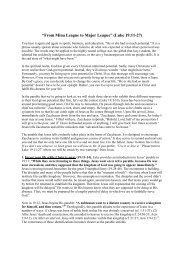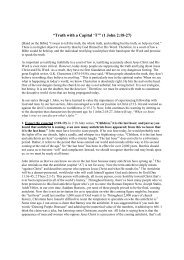“Transformed: More Than Meets the Eye” (Romans 12 - Razorplanet
“Transformed: More Than Meets the Eye” (Romans 12 - Razorplanet
“Transformed: More Than Meets the Eye” (Romans 12 - Razorplanet
Create successful ePaper yourself
Turn your PDF publications into a flip-book with our unique Google optimized e-Paper software.
Admittedly, it can be difficult to always be cognizant of God’s mercies. I can often fall back into an<br />
unhealthy works-mentality. I can apply this orientation to my personal life, ministry, marriage, and children.<br />
When I adopt this faulty motivation, I often see results, but only for a few days. Long-lasting change only<br />
occurs when gratitude for God’s mercies is <strong>the</strong> chief motivation. The Bible’s way of preaching holiness<br />
begins by reminding Christians who <strong>the</strong>y are, what <strong>the</strong>y are, and what <strong>the</strong>y have. Who are we? We are<br />
<strong>the</strong> children of God with all of <strong>the</strong> power of God working on our behalf? Where are we? We are in <strong>the</strong><br />
kingdom of God and have died to <strong>the</strong> dominion of sin. What do we have? We have <strong>the</strong> Holy Spirit, we<br />
have Jesus’ intercession working for us, and we have <strong>the</strong> power of God ready to come to our aid. 17<br />
Hence, <strong>the</strong> best way to motivate people is to show <strong>the</strong>m what God has done for <strong>the</strong>m and let <strong>the</strong>m rise to<br />
<strong>the</strong> challenge of responding to that love appropriately.<br />
In response to God’s mercies, Paul challenges us “to present” (paristemi) our bodies. 18 Although this<br />
exhortation is not an imperative, it should be understood as such (cf. <strong>12</strong>:2). 19 But please note that Paul<br />
does not say “yield” or “surrender” your bodies but “present” <strong>the</strong>m. Yield and surrender are biblical<br />
terms, but <strong>the</strong>y imply a measure of reluctance or hesitancy. Present, on <strong>the</strong> o<strong>the</strong>r hand, implies a glad,<br />
happy, willing offering of oneself. If I yield or surrender a gift to my wife, she will not be impressed by<br />
my efforts. Our presentation of our bodies to God as a sacrifice for His use, just like my presentation of a<br />
gift to my wife, is to be a joyous and spontaneous act. 20 God is not asking you to dedicate your gifts,<br />
abilities, money, time, ideas, creativity, or any such thing. He is asking you to sacrifice yourself. 21 This is<br />
an appeal to those who have been set free by grace to live under grace by presenting all that <strong>the</strong>y are to<br />
God. Incidentally, Paul uses <strong>the</strong> same verb “to present” (paristemi) in 14:10 where it means that one day<br />
you will “present” yourself before <strong>the</strong> judgment seat of Christ. 22 If you faithfully “present” your body to<br />
Christ you will experience great reward at <strong>the</strong> bema. Beliefs should impact behavior.<br />
Paul states that you are to present your body 23 as a “living and holy sacrifice, acceptable to God.” 24<br />
The words “living,” “holy,” and “acceptable” all follow <strong>the</strong> noun “sacrifice.” There are three qualities of<br />
our sacrifice: (1) Living: In <strong>the</strong> Old Testament believers were called to “make” a sacrifice from a dead<br />
sacrifice. 25 In <strong>the</strong> New Testament believers are called to “be” a sacrifice from a living sacrifice. 26 The<br />
point is: God wants you to live to die. Most believers could take a bullet for Christ in a moment of<br />
courage, but every believer struggles to die to self and live for Christ on a daily basis. 27 (2) Holy: We are<br />
to be wholly dedicated, “set apart” from <strong>the</strong> world and belonging to God. The term speaks of being fully<br />
abandoned to God. This means that as individual Christians and as a corporate church, we must do all<br />
that we can to ensure that holiness is promoted. 28 That is why we must exercise church discipline. That is<br />
why we must speak <strong>the</strong> truth in love. That is why we must disciple new believers. We are commanded to<br />
be holy as God is holy. (3) Acceptable: 29 The term “acceptable” builds on <strong>the</strong> Old and New Testament<br />
concept of <strong>the</strong> sacrifice as pleasing God. 30 When you present your body as a sacrifice that is living and<br />
holy God is pleased.<br />
Paul states that when you present your body as a sacrifice you have fulfilled your “spiritual service of<br />
worship.” The Greek adjective translated “spiritual” 31 is logikos, from which we derive <strong>the</strong> English word<br />
“logical.” Logikos pertains to reason or <strong>the</strong> mind, and <strong>the</strong>refore does not really mean “spiritual.” It is<br />
better translated “reasonable” or “rational” (see <strong>the</strong> NASB marginal note, NET, KJV, NKJV). 32 I think<br />
what Paul is saying is: “If you consider all that God has done for you—a sinful being—<strong>the</strong> only<br />
reasonable response is to offer Him your life” (cf. 6:1–3, 15–16). 33 After all, this is <strong>the</strong> only logical<br />
response! Why would freed slaves continue to serve <strong>the</strong>ir old master? Presenting your body to serve <strong>the</strong><br />
interests of your new Master, on <strong>the</strong> o<strong>the</strong>r hand, is completely logical—very much in keeping with good<br />
sense. A response of sacrificial worship expresses a heart of gratitude. It puts feet to our faith. Beliefs<br />
should impact behavior.



